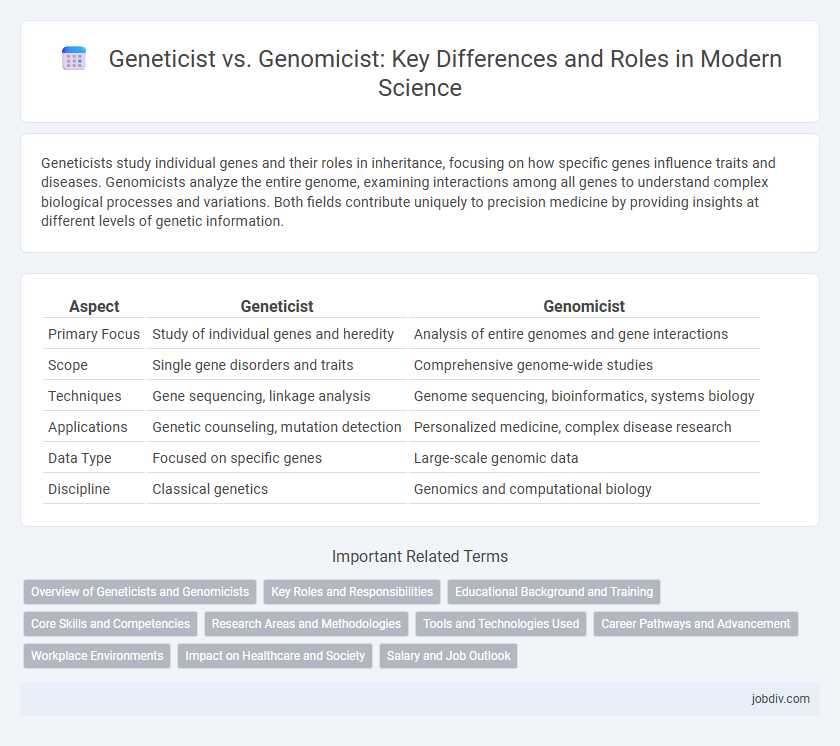Geneticists study individual genes and their roles in inheritance, focusing on how specific genes influence traits and diseases. Genomicists analyze the entire genome, examining interactions among all genes to understand complex biological processes and variations. Both fields contribute uniquely to precision medicine by providing insights at different levels of genetic information.
Table of Comparison
| Aspect | Geneticist | Genomicist |
|---|---|---|
| Primary Focus | Study of individual genes and heredity | Analysis of entire genomes and gene interactions |
| Scope | Single gene disorders and traits | Comprehensive genome-wide studies |
| Techniques | Gene sequencing, linkage analysis | Genome sequencing, bioinformatics, systems biology |
| Applications | Genetic counseling, mutation detection | Personalized medicine, complex disease research |
| Data Type | Focused on specific genes | Large-scale genomic data |
| Discipline | Classical genetics | Genomics and computational biology |
Overview of Geneticists and Genomicists
Geneticists study individual genes and their roles in heredity and disease, focusing on gene mutations and inherited traits. Genomicists analyze entire genomes, examining complex interactions among genes and environmental factors to understand multifactorial diseases and genetic variation. Both fields utilize advanced sequencing technologies but differ in scope, with geneticists targeting specific genes and genomicists exploring the comprehensive genomic landscape.
Key Roles and Responsibilities
Geneticists primarily analyze individual genes and inherited traits to diagnose and study genetic disorders, focusing on gene mutations and Mendelian inheritance patterns. Genomicists examine the entire genome's structure, function, and interaction, using high-throughput sequencing technologies and bioinformatics to understand complex diseases and personalized medicine. Both roles involve interpreting genetic data, but genomicists integrate multi-omic datasets to advance precision health strategies.
Educational Background and Training
Geneticists typically pursue degrees in genetics, biology, or related fields, often completing a Ph.D. with specialized research in gene function and heredity. Genomicists usually have advanced training in genomics, bioinformatics, and computational biology, emphasizing large-scale DNA sequencing and data analysis techniques. Both fields require strong foundational knowledge in molecular biology, but genomicists integrate interdisciplinary skills to interpret complex genome-wide data.
Core Skills and Competencies
Geneticists specialize in understanding individual genes and their roles in heredity, often focusing on gene mutations and inheritance patterns, requiring strong skills in molecular biology, genetic counseling, and laboratory techniques. Genomicists analyze entire genomes using bioinformatics, computational biology, and data analysis to study gene interactions and their effects on health and disease. Both fields demand proficiency in genetics, but genomicists emphasize computational skills and large-scale data interpretation, while geneticists focus more on clinical and experimental genetics.
Research Areas and Methodologies
Geneticists primarily study individual genes and their roles in heredity, using techniques such as gene sequencing and mutation analysis to understand gene function and inheritance patterns. Genomicists focus on the comprehensive analysis of entire genomes, employing high-throughput sequencing technologies, bioinformatics, and systems biology approaches to explore gene interactions and complex traits. Research areas for geneticists often include Mendelian disorders and gene mapping, while genomicists investigate genome-wide associations, epigenomics, and population genomics to address multifactorial diseases and evolutionary biology.
Tools and Technologies Used
Geneticists primarily utilize tools such as PCR machines, gel electrophoresis, and DNA sequencing to study individual genes and their functions. Genomicists employ advanced technologies including whole genome sequencing, bioinformatics software, and CRISPR gene editing to analyze entire genomes and complex genetic interactions. Both fields rely heavily on computational platforms for data analysis, but genomicists integrate multi-omics data for broader insights into genetic regulation.
Career Pathways and Advancement
Geneticists primarily focus on the study of individual genes and their roles in heredity, often pursuing careers in clinical diagnostics, research, and genetic counseling, with progression typically involving specialization in molecular genetics or medical genetics. Genomicists analyze the entire genome using bioinformatics and computational biology, advancing their careers through expertise in large-scale data analysis, sequencing technologies, and systems biology, often securing roles in personalized medicine and biotechnology innovation. Career advancement for both fields depends on interdisciplinary skills, continuous education, and contributions to cutting-edge research, with genomicists increasingly in demand due to the growing emphasis on precision medicine.
Workplace Environments
Geneticists primarily work in clinical laboratories, hospitals, and research institutions focusing on single-gene disorders and hereditary conditions, employing techniques such as DNA sequencing and karyotyping. Genomicists operate in multidisciplinary environments including bioinformatics centers, pharmaceutical companies, and large-scale research consortia, utilizing high-throughput technologies like next-generation sequencing and computational models to analyze entire genomes. Both professions collaborate with healthcare providers and data scientists but differ in scale and complexity of genetic data handled.
Impact on Healthcare and Society
Geneticists analyze single genes to diagnose inherited disorders, enabling targeted treatments and early intervention strategies that improve patient outcomes. Genomicists examine entire genomes to understand complex diseases, advancing precision medicine, and public health initiatives through comprehensive data integration. Both fields drive innovations in healthcare, promoting personalized therapies and informing societal policies on genetic ethics and accessibility.
Salary and Job Outlook
Geneticists typically earn a median annual salary ranging from $80,000 to $110,000, while genomicists, due to their specialized skills in analyzing complex genomic data, often command higher salaries between $90,000 and $130,000. The job outlook for genomicists is projected to grow by approximately 15% over the next decade, driven by advancements in personalized medicine and biotechnology, whereas geneticists see a steadier growth rate near 7%. Both professions benefit from increasing demand in healthcare research, but genomicists are particularly sought after in roles involving cutting-edge data analysis and genomic sequencing technologies.
Geneticist vs Genomicist Infographic

 jobdiv.com
jobdiv.com